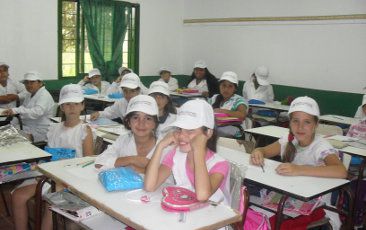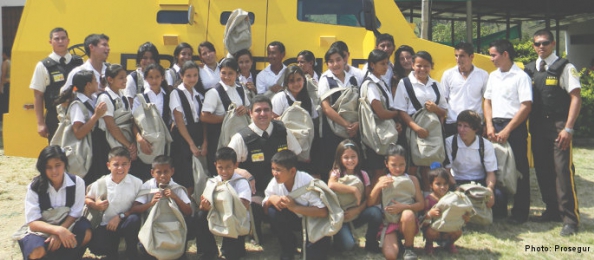Piecitos Colorados – Educating to Develop Latin America
Piecitos Colorados is a Prosegur development cooperation project that seeks to improve the comprehensive education and the quality of life of children living in disadvantaged areas of Latin America where the company is present. Opting for an approach that is not conducive to dependency, the program prioritizes the teachers, students, and their families being actively committed to transforming the school and to turning them into the driving forces of their communities.
By refurbishing the schools and overhauling the basic services, applying nutritional programs, as well as improving education and awareness-raising among the families and the communities, the project seeks to reduce the school dropout rate and to foster the development of the communities where it is established. Piecitos Colorados is managed by Fundación Prosegur and is currently set up in seven countries (Argentina, Brazil, Colombia, Chile, Paraguay, Peru, and Uruguay), where it benefits more than 4,000 students from 30 schools in different intervention phases.
The origins of the project date back to 2006, when a group of Prosegur employees in Argentina discovered the difficult situations of some rural schools in the north of the country, with serious shortcomings in their infrastructures and basic services. They were located in isolated zones and the students had to walk for miles to attend class, resulting in their feet being stained by the red earth of the path – they were affectionately referred to by their teachers as “piecitos colorados” (little red feet).
The company – at a local level – decided to support them by means of a school sponsorship process to rebuild their facilities. One year later, this spontaneous and initial aid played a fundamental role in Fundación Prosegur’s decision to take over the project, put it on a professional footing, and extend it to the other countries of Latin America, based on the conviction that education is the best future guarantee for these “piecitos.”
| Initiator | Fundación Prosegur |
| Project start | 2006 |
| Status | ongoing |
| Region | Latin America |
| Contact person | |
| Awards |
Project benefit
- Improving education
- Fostering the development of the communities
- Improving nutrition
| Anti-Corruption | - |
| Business & Peace | - |
| Development | X |
| Environment |
|
| Financial Markets | - |
| Implementing UNGC Principles in your Corporate CSR Management | - |
| Human Rights | - |
| Labour Standards | - |
| Local Networks | - |
| Advocacy of global issues | - |
| Business opportunities in low income communities/countries | - |
| Project funding | - |
| Provision of goods | - |
| Provision of services/personal | X |
| Standards and guidelines development | - |
For a comprehensive education
Piecitos Colorados, as a development cooperation program, seeks to be an agent for change. Its comprehensive approach means that it avoids one-off interventions to emphasize training and cooperation. By developing human capacities and improving the use of the local resources, the aspiration is that the educational centers achieve levels of self-management and autonomy in the long run by increasing their development opportunities.
In order to work in such different contexts and countries without losing the essence of the project, an Internal Manual has been produced. It is followed by all of the Prosegur teams involved in Piecitos Colorados, and sets out the main criteria for selecting a school that may qualify for the program. Furthermore, the initiative has its own Business Plan, subject to a quarterly reporting procedure, in order to administer the resources transparently and exercise their effective control.
Piecitos Colorados believes in establishing a strong link with each beneficiary educational center. Therefore, once the school is selected, an Affiliation Agreement is entered into to guarantee a transparent intervention and to break down the duties and rights for both parties. Once the cooperation has been formalized, the intervention phase kicks off in four progressive levels.
- Phase 1 – Infrastructures: Depending on the state of each school, the emphasis is on improving its facilities to provide an appropriate environment for educational development and optimum hygiene and health conditions.
- Phase 2 – Nutritional Training: The goal is to foster healthy eating habits and encourage better use of local resources. In order to tackle this stage, a strategic alliance has been set up with a nongovernmental development organization (NGDO) specializing in this area – Nutrición Sin Fronteras – based on efficiency and innovation criteria, with an emphasis on a long-term sustainable approach. Thus, employees, parents, and teachers work together as a team to obtain the nutritional data of the students by means of an information transmission human chain. This means that experts do not need to be sent over from Spain, thus obtaining a good cost-efficiency ratio for the action. The surveys are designed in Barcelona (NGDO’s headquarters) and are sent out through the different Prosegur delegations until they reach the schools. The proximity of the local teams with the schools enables the surveys to be adapted beforehand to the language and customs of each region. Furthermore, the questions are asked by a “friendly” voice (the teacher) to avoid any conditioning of the answers. The chain then goes into motion again and the nutritional data is sent to Spain, where it is diagnosed and the most appropriate measures for each school are established.
- Phase 3 – Educational Quality: Without interfering in the official curriculums, this phase focuses on the overhauling of the teaching tools and educational materials. It is the period in which the students are encouraged to respect the environment and to access the new information technologies.
- Phase 4 – Sports: This last phase tries to hearten the students to do sports and foster their physical development, along with highlighting the values of team work, effort, and healthy competition.
The combination of all these measures has enabled significant advances to be detected, such as the reduction of school absenteeism and greater teacher motivation as well as progress in the self-management of the centers (vegetable gardens, greenhouses, and corrals) and in the entrepreneurship spirit of the families (sewing and literacy workshops). In short, great impetus has been given to developing the communities through the schools.
The initiative therefore stresses ongoing training. Therefore, the students that show the greatest skills are monitored and then supported through a Prosegur Talent Scholarship, so that they can continue to study and, thus, complete the program’s circle of aid: teaching professionals who will work for their communities in the future.
A project involving everyone
Piecitos Colorados would not have been able to evolve without the solidarity work of the whole Prosegur workforce. The field intervention by the professionals involved in the project enables direct monitoring to take place and an ongoing assessment of the actions deployed. This is undoubtedly one of its hallmarks: Comprehensive management – from its planning to its execution and monitoring – is in the hands of the company. The link between the workforce and Piecitos Colorados is established right from the start. The employees themselves are the ones who can propose candidate schools; are part of the Selection Committees; cooperate with the work teams; take part in the volunteer activities (painting walls, planting, and weeding vegetable gardens, building greenhouses, etc.); and suggest aspects to improve the program through the website, Intranet, or the specific Piecitos Colorados inboxes. In order to ensure a continuous improvement process and identify the best practices, the initiative has its own Competence Center – similar to the one that the company has established in its business lines, wherein teachers, employees, and managers exchange experiences to continue driving the project.

The commitment and support of the Prosegur employees has turned Piecitos Colorados into a forward-looking program that continues to attract new initiatives in different areas every day. The President of Prosegur and Fundación Prosegur, Helena Revoredo, thus pointed out: “We have been ambitious with the challenge and robust when defining an intervention model, but we knew that we had the best tool to drive it: the people that are part of our Company.”
A responsible company
Prosegur is aware of its responsibility to its customers, employees, and shareholders, and of its role in the development of the societies where it is present. The company, which has been a UN Global Compact participant since 2002, is a partner and a member of the Spanish Network Steering Committee, which promotes the Ten Principles that make up this initiative.
The social action of the company is managed through Fundación Prosegur, which in 2012 expanded and consolidated its projects, which are focused on the fields of education, social and occupational integration of disabled persons, and corporate volunteering, which benefits more than 40,000 people in three continents.
Key Informations
Where it is deployed:
- Latin American countries where Prosegur is present (Argentina, Brazil, Chile, Colombia, Paraguay, Peru, and Uruguay)
- Number of beneficiaries: more than 4,000
- Number of schools: 30
General objective:
The approach of the project goes beyond the refurbishing of the schools to offer tools – by means of training – to the most disadvantaged populations so that they can take center stage in their development and achieve durable changes. Through the improvement of facilities, the application of nutritional programs, as well as an improvement in education and awareness-raising among families and the community, the aim is to reduce the school dropout rate and drive local progress.
Institutions involved:
As it is a cooperation program, it requires the collaboration and active commitment of its beneficiaries. Thus, given that schools are a living part of their communities, institutional relations are established with the local educational authorities, and schools are encourage to work with the local institutions to make change possible.
This project description was originally presented in the Global Compact International Yearbook 2013.
Write a comment about this page
Your comments are provided by your own free will and you take sole responsibility for any direct or indirect liability. In order to maintain the highest discussion quality, all comments will be reviewed by our editors. You hereby provide us with an irrevocable, unlimited, and global license for no consideration to use, reuse, delete or publish comments in accordance with our Community Guidelines.
About Us // Privacy Policy // Copyright Information // Legal Disclaimer // Contact
Copyright © 2012-2018 macondo publishing GmbH. All rights reserved.
The CSR Academy is an independent learning platform of the macondo publishing group.









